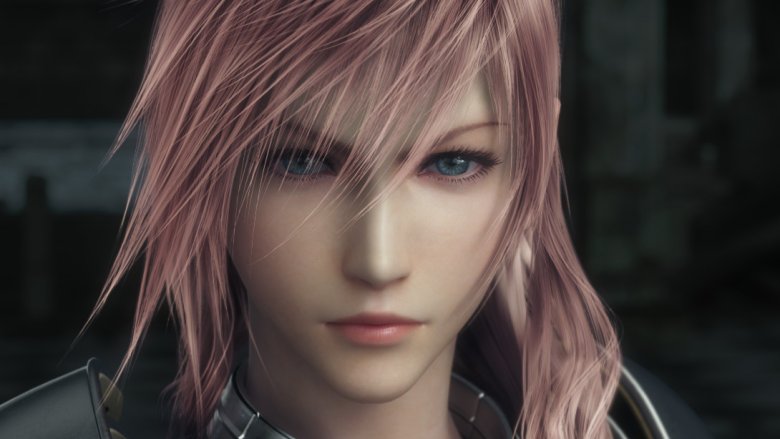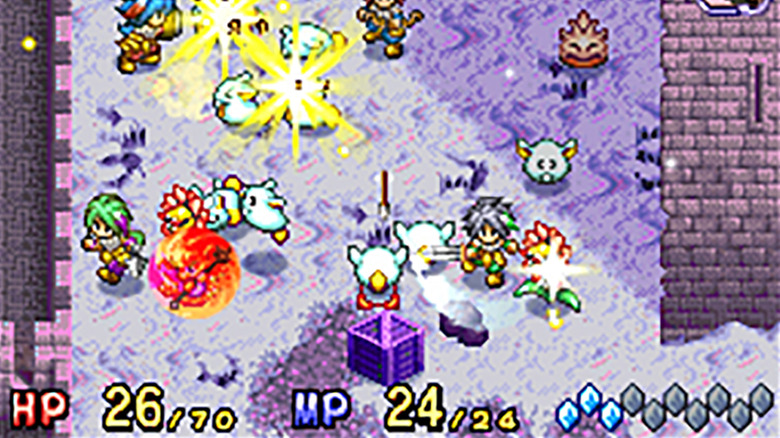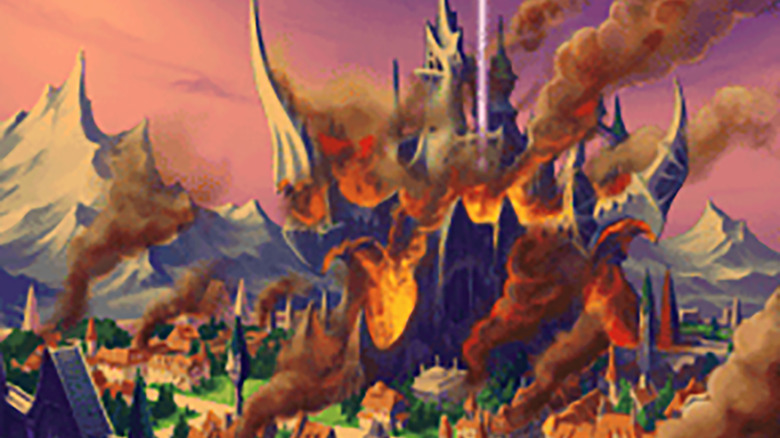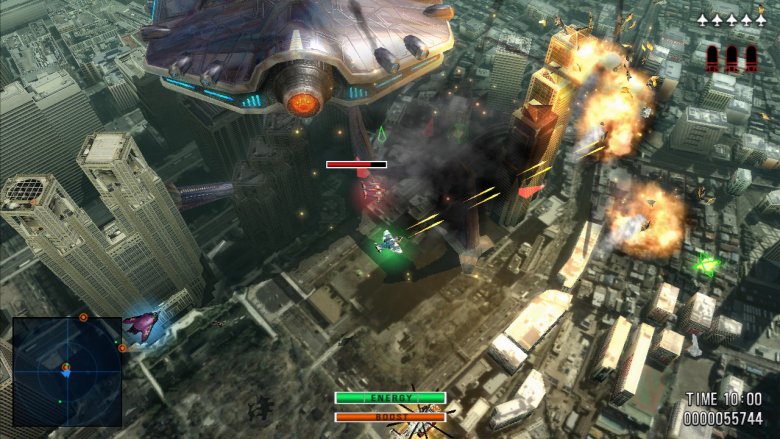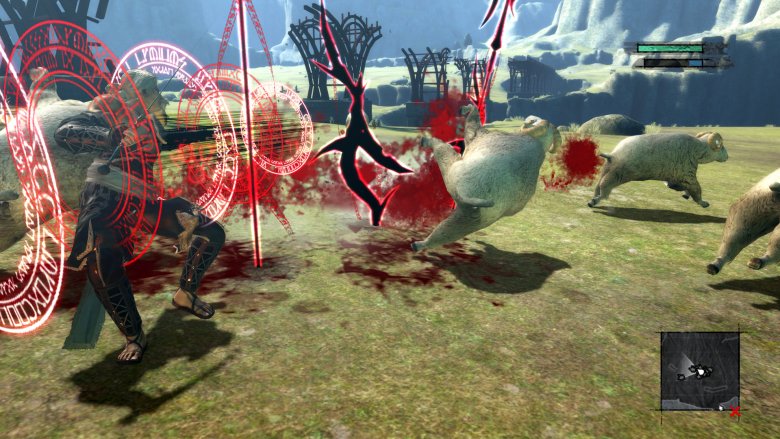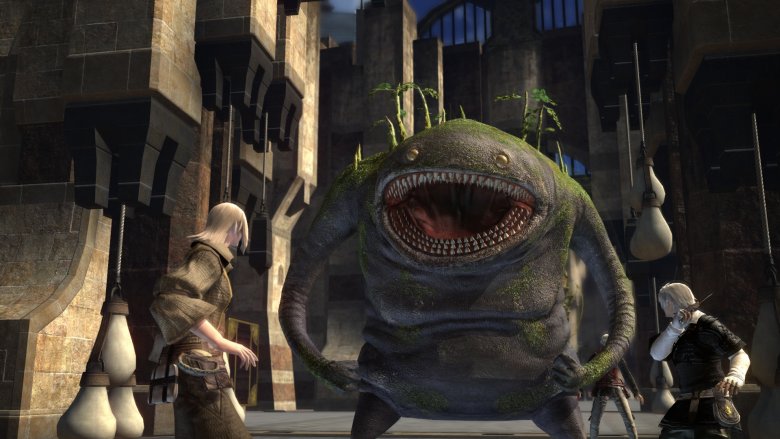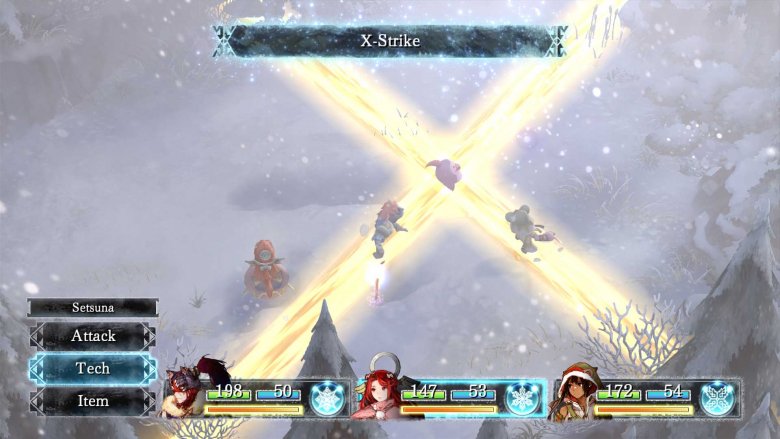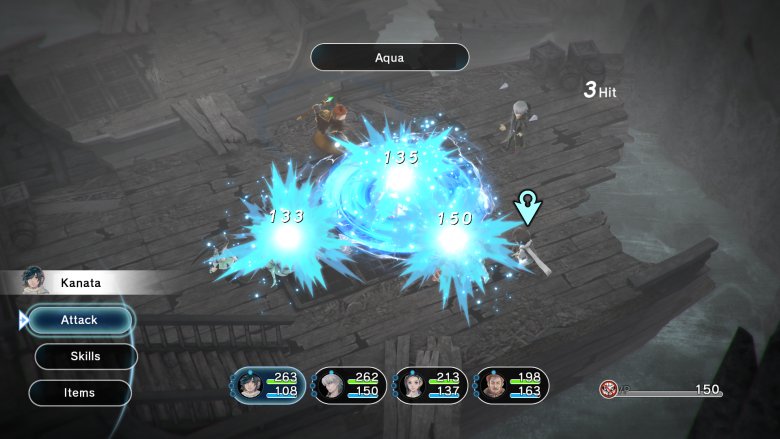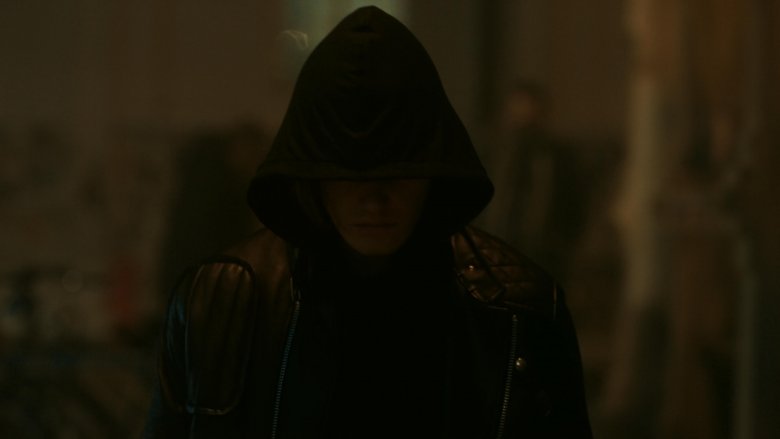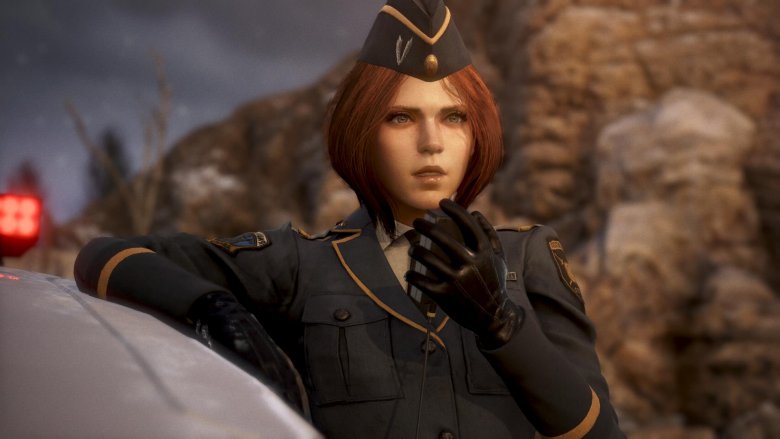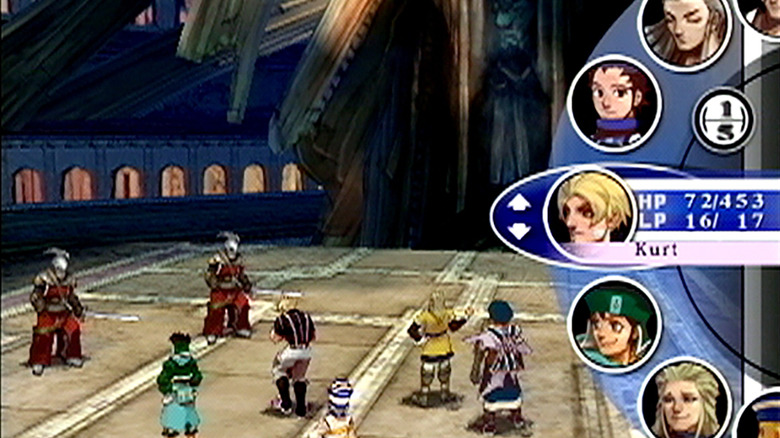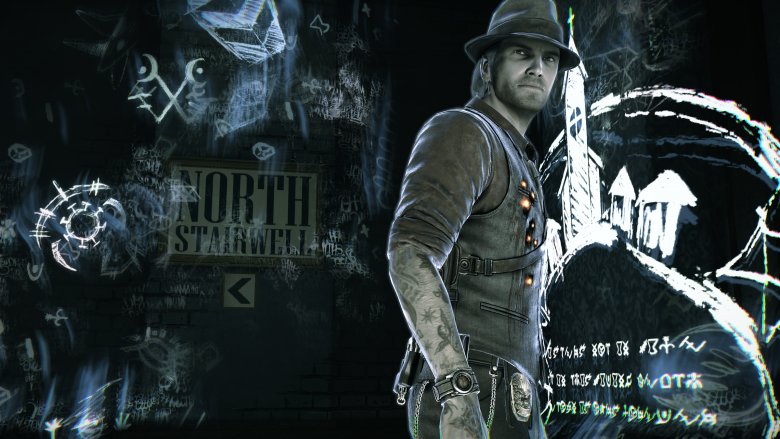Square Enix Games That Totally Flopped Hard
The video game medium owes a lot to Square Enix. Created from the merger of Square and Enix in 2003, the conglomerate has been responsible for many iconic franchises. Square brought Final Fantasy to the world, turning it into a household name. Meanwhile, Enix had Dragon Quest, a celebrated JRPG franchise in its own right. The genre wouldn't be where it is today without Square Enix paving the way. Furthermore, the company has branched out in the past few decades. Now it publishes other major franchises, like Tomb Raider, Just Cause, and Deus Ex.
But in Square Enix's time as a developer and publisher, it has been responsible for some real stinkers. Some of its games have been subject to poor reviews, poor sales, or the unfortunate mix of both. A few of these games have been lost to the annals of time, while others flopped so horribly that they're still remembered in infamy.
Join us as we take a look at some Square Enix games that totally flopped.
Children of Mana: Below expectations
The World of Mana series has been around since the early 1990s, and of all the games released, Secret of Mana might be the most well known. It's the only one to get the HD remake treatment, after all. Outside of that, though, the Mana series hasn't broken into the mainstream in the same way Final Fantasy or Dragon Quest ever did.
One of the franchise's lowest points came during its first foray onto the Nintendo DS. Children of Mana released in November 2006 exclusively for the handheld system, and the reviews made it out to be an easily forgettable game. The combat, which is arguably the most crucial part of any action-RPG, didn't stand out to most critics at the time.
To be fair, Children of Mana released around the same time Nintendo was having issues keeping store shelves stocked with DS Lites. With a shortage of consoles in mind, the game sold below expectations, moving a little more than 100,000 units in its first week. Needless to say, if you're looking to get into the Mana series, maybe Children of Mana isn't the best place to start.
Heroes of Mana: In sore need of a hero
Things didn't get better for the World of Mana franchise after Children dropped on the Nintendo DS. The shadow of Secret of Mana loomed over every game before and after it, and nothing really lived up to those expectations. Heroes of Mana producer Koichi Ishii tried to attract a new crowd by adding an entirely different genre to the table: real-time strategy.
Unfortunately for Ishii, the consumer market in Japan at the time wasn't ready to embrace RTS games. He knew this, and he had hoped Heroes of Mana would be the game to break the mold. Instead, it fell to the wayside without penetrating the market in any meaningful way, despite the producer's confidence and good intentions.
"It is our belief that we succeeded in creating a highly playable and enjoyable RTS for the DS, and we are confident that we provided the users who did play it with a new, innovative experience," Ishii said in an interview with Cubed3. "However, people can be wary of the unknown, and perhaps the lack of exposure the RTS genre receives in Japan caused some hesitation."
Internationally, the game wasn't well received either, earning mostly mixed reviews, according to Metacritic. The weak reception was most apparent when Square Enix revealed its results in the first half of fiscal year 2007. Across the board, Heroes of Mana ranked low on number of units sold both in Japan and North America.
0 Day Attack on Earth: A 0/10 twin-stick shooter
Back in 2009, Square Enix dipped its toes into the twin-stick shooter genre by backing a Japanese game developer named Gulti. The studio doesn't have any major, well-known hits under its belt, but it primarily develops shoot-em-ups. One of its early titles was a game called 0 Day Attack on Earth. If you haven't heard of it, we can't blame you. It released on Xbox 360 via the Xbox Live Arcade and retailed for the equivalent of $15.
However, it wasn't met with any sort of praise. In fact, the game was savagely criticized by reviewers, culminating in an abysmal 41 average score on Metacritic. The gameplay itself is so straightforward it's dull; for example, every boss can be killed with the exact same strategy, which involves standing still and blasting all your weapons. 0 Day doesn't engage you in any way, and your suicidal AI companions do nothing to make the game easier. You could alleviate the AI problems by playing the game cooperatively with friends, but chances are, you and your friends would rather do almost anything else.
Nier: Not Nierly as good as its sequel
Nier might be the most unorthodox choice to put on this list. By all accounts, it failed upon launch. It had an average of 68 on Metacritic for PlayStation 3, and many critics found that it didn't benefit from the sum of its parts. All the various mechanics were jarring and hard to grasp, and many bemoaned the graphics, which weren't that great even for the time.
Even game director Yoko Taro admitted to Nier's faults. In an interview with Polygon in 2015, he didn't exactly have high praise for his game. "The way I look at original Nier, it's like your mom's home cooking," Taro said. "It may not be great, but it's OK. You're comfortable with it."
In Japan, two versions of the game were released at the same time: Nier Gestalt for the Xbox 360 and Nier Replicant for the PS3. They were both nearly identical, although Replicant's protagonist was younger, and he tries to save his sister. Replicant sold surprisingly well in Japan, moving 60,000 copies in its first week. Gestalt, on the other hand, was the version that made its way around the world, suffering from poor sales and middling reviews. Needless to say, it didn't seem like a game that would have a sequel that would go on to sell more than 4 million copies.
Final Fantasy 14: A realm that needed a rebirth
Final Fantasy 14 as it exists today makes a compelling case for giving games a second chance. The current iteration, released under the subtitle A Realm Reborn, completely overhauled the original release. This restructuring made it one of the most successful MMORPGs in recent memory, racking up a whopping 14 million players by its fifth anniversary.
But Final Fantasy 14 wasn't always this praised. When it launched on PC in 2010, the name alone was practically toxic to the Square Enix brand. Even CEO Yoichi Wada admitted it. In 2011, he told a Japanese publication, "The Final Fantasy brand has been greatly damaged."
The original Final Fantasy 14 released to shocking reviews, earning a Metacritic average of 49 on PC. Reviewers hounded the game for its broken user interface and game-breaking bugs. Perhaps worst of all, many commented that the content was generally uninteresting and tedious.
Square Enix took its time restructuring the original game. It even extended the free trial period for prospective customers until the company figured out what to do. By December 2010, the company cut its annual net profit forecast down to 10% of what it once was. While no one specifically blamed Final Fantasy 14, a spokesperson did tell Gematsu it has not "achieved the level of customer satisfaction that fans of our Final Fantasy franchise have come to expect."
I am Setsuna: Financial deficit
In 2015, Square Enix announced that it formed a new development house named Tokyo RPG Factory. The first game the studio would work on was mysteriously dubbed Project Setsuna, which would, obviously, be an RPG. The game went on to be released under the name I Am Setsuna, which cemented the studio's main purpose: to prey upon people's nostalgia for the old-school JRPGs of yesteryear.
I am Setsuna's battle system evokes flashbacks of the classic game Chrono Trigger. Even the ability "X-Strike" makes a return. Everything about its user interface felt like a 1990s JRPG brought into the modern day. It released in 2016 to admirable reviews, leveling out at 74 on Metacritic for PlayStation 4. Most reviewers enjoyed the many homages to the games of the past, but some criticized it for not doing much more than that.
However, Tokyo RPG Factory suffered some hefty losses after the release of I Am Setsuna. Despite the fair praise and focus on nostalgia, the studio posted a 244 million yen loss (roughly $2.4 million) just two weeks after the game went on sale. This is after the game sold more than 60,000 copies in its first week in Japan. Things haven't gotten much better for Tokyo RPG Factory since then.
Lost Sphear: Lost sales
After the release of I Am Setsuna in 2016, Tokyo RPG Factory shifted gears toward its next big project: Lost Sphear. Lo and behold, it was yet another nostalgia-fueled JRPG, and it was pitched as the "spiritual successor" to I Am Setsuna. Lost Sphear received similar review scores compared to its predecessor, with its PlayStation 4 Metacritic average clocking in at 68, even worse than the studio's first project.
Things, however, took a turn for the worse for Tokyo RPG Factory. In its opening week in Japan, Lost Sphear sold a total of 13,133 units across the PS4 and Nintendo Switch. For context, that was only 20% of the first shipment Square Enix sent out to the Japanese market. That pales in comparison to I Am Setsuna's opening week, which saw more than 60,000 PS4 and PlayStation Vita copies sold. Despite moving that much merchandise, Tokyo RPG Factory reported a loss of more than $2 million two weeks after launch. We can't imagine what that means for the studio after the sparse sales of Lost Sphear.
The Quiet Man: The loudest downfall
If you don't remember The Quiet Man, we can't blame you. The name says it all. The game received a surprise announcement at E3 2018 via a flashy trailer. In it, everything was filmed in live action. We saw the main character carrying a brown paper bag down an alley, and suddenly, some thugs appear out of nowhere. The protagonist points at his ear, miming that he can't hear them. Then everything shifts into 3D rendered cutscenes, with the words "SILENCE RINGS LOUDEST" interlaced between some fighting scenes.
It was mysterious, and the perspective of a deaf main character was something new and exciting, especially from an industry giant like Square Enix. When it finally released in November 2018, though, no one expected how terrible the game would be. Receiving an abysmal 29 on Metacritic for PlayStation 4, the game was panned for its awful design choices, particularly surrounding the narrative.
The protagonist, Dane, can understand other characters despite his deafness. However, since the game cuts out all the audio in the first playthrough, you, the player, most likely can't understand anything. The Quiet Man received a patch one week after release that added the audio, but it only worked after you beat the game once. Between these obtuse cutscenes lie some brain-dead combat sequences. At every step of the way, this game challenges players to not engage with it, and for all intents and purposes, it succeeded.
Left Alive: But just barely
The story of Left Alive is a sad one. The recent spiritual successor to the long-running Front Mission franchise released in Japan a week earlier than it did in the West, but that week was all we needed to see that something terrible was happening. The game launched Feb. 28, 2019 in Japan, and by March 3, outlets reported that Square Enix had patched out the ability to stream the game using the PlayStation 4's share function. Around the same time, reports came in saying that Amazon Japan had already slashed the price of the game to nearly 50 percent off. The game would then launch for North America on March 5, and boy was it ugly.
With it all said and done, the Metacritic average for the PS4 edition of Left Alive sits at 37, a clear sign of the game's lack of quality. Many critics pointed to a general lack of polish, and an unexpectedly high difficulty puts off anyone who even tries to play it. The game was a complete failure in both the West as well as Japan. In fact, by March 8, some brick-and-mortar stores in Japan were selling the game at 60 percent off. To add salt to the wound, Amazon Japan deepened its discount to 67 percent off. Too bad for Square Enix, because it seems like everyone turned off of Left Alive.
Unlimited SaGa: Limited appeal
Unlimited SaGa is the ninth entry in the the SaGa franchise, which has been around since the first game's release on the original Game Boy in Japan in 1989. When it launched on the PlayStation 2 in 2002, it did well in Japan, selling more than 196,000 copies in the first week alone. By the middle of 2003, it sold more than half a million copies, earning it a Gold Prize from Sony. So why would a game like Unlimited SaGa be on this list?
Well, a majority of this success was confined to the shores of Japan. Beyond its borders, Unlimited SaGa failed to impress anyone. On its Metacritic page, not a single one of the 26 curated reviews gave the game a positive score. The average score sits at 45. Many Western reviewers criticized the game's overly complex mechanics.
The combat in Unlimited SaGa involves a reel system, as if you were playing a game of slots and betting on pure chance. Exploring the world is done through a board-game-like user interface that was obtuse. As a holistic package, the game had no merits, leading to a nearly universal dislike of the title.
Murdered: Soul Suspect: An unfortunate narrative
Airtight Games, the studio behind Murdered: Soul Suspect, never exactly caught a break in the gaming industry. Back in 2010, the studio released its debut game, Dark Void, with the help of Capcom. It didn't make much of an impact in the community, but the studio stuck around to develop a few more games. Its last one was Soul Suspect, published by Square Enix, which also barely made a splash in the community at large. Its middling reviews painted an unattractive picture of the narrative and gameplay, which many critics considered bland and repetitive.
In the weeks after Soul Suspect's release, things weren't looking alright for Airtight. Mere weeks after launch, the Redmond, Washington studio completely shut down without warning. GeekWire reported the story first, including a somber photo of the studio's front door covered by a sign that read, "Office equipment blow out sale! Company closing doors." Later on Twitter, the company's official account posted two solemn tweets.
"Thanks to all of the fans, family, friends and colleagues who supported us and made the last 10 years possible," the company posted. "Thanks to all of the amazing people that worked on Dark Void, Quantum Conundrum, Murdered, Soul Fjord, Pixld and DerpBike."
While Soul Suspect wasn't necessarily cited as the reason the studio closed its doors, it's suspicious how close the game's release was to Airtight's shutdown. Perhaps in a different world where Soul Suspect sold well, we'd still see Airtight produce games today.

